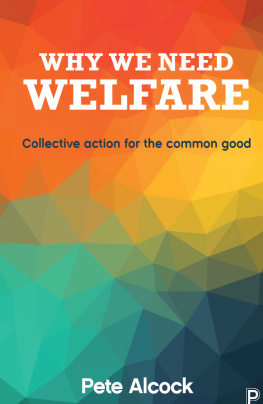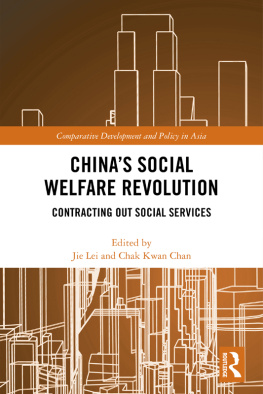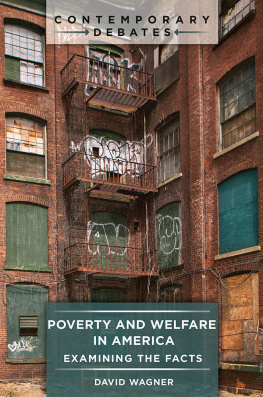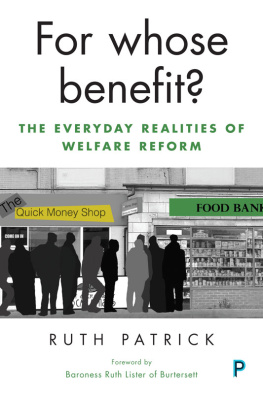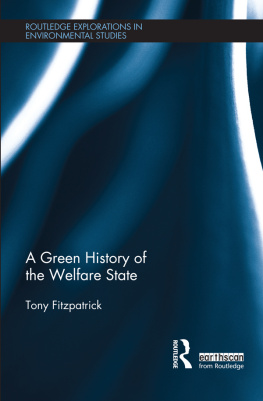WHY WE NEED WELFARE
Collective action for
the common good
Pete Alcock
First published in Great Britain in 2016 by
Policy Press University of Bristol 1-9 Old Park Hill Bristol BS2 8BB UK Tel +44 (0)117 954 5940 e-mail
North American office: Policy Press c/o The University of Chicago Press 1427 East 60th Street Chicago, IL 60637, USA t: +1 773 702 7700 f: +1 773-702-9756 e:
Policy Press 2016
British Library Cataloguing in Publication Data
A catalogue record for this book is available from the British Library
Library of Congress Cataloging-in-Publication Data
A catalog record for this book has been requested
ISBN 978-1-4473-2834-6 paperback
ISBN 978-1-4473-2836-0 ePub
ISBN 978-1-4473-2837-7 Mobi
The right of Pete Alcock to be identified as author of this work has been asserted by him in accordance with the 1988 Copyright, Designs and Patents Act.
All rights reserved: no part of this publication may be reproduced, stored in a retrieval system, or transmitted in any form or by any means, electronic, mechanical, photocopying, recording, or otherwise without the prior permission of Policy Press.
The statements and opinions contained within this publication are solely those of the author and not of the University of Bristol or Policy Press. The University of Bristol and Policy Press disclaim responsibility for any injury to persons or property resulting from any material published in this publication.
Policy Press works to counter discrimination on grounds of gender, race, disability, age and sexuality.
Cover design by Hayes Design
Readers Guide
This book has been optimised for PDA.
Tables may have been presented to accommodate this devices limitations.
Image presentation is limited by this devices limitations.
For Anna and Chris, and Dan and Tom
List of boxes and figures
Boxes
Figures
About the author
Pete Alcock is Professor of Social Policy and Administration at the University of Birmingham. Pete has taught and researched social policy for over 30 years, moving to Birmingham in 1998, where he has held a number of posts, including Head of the School of Social Sciences and Director of the ESRC Third Sector Research Centre (TSRC). He is author and editor of a number of leading books on social policy, including The students companion to social policy (5th edn, forthcoming, 2016). His research has covered the fields of poverty and anti-poverty policy, social security, and the role of the UK third sector.
Preface and acknowledgements
I was born in 1951. Wartime rationing was still in force and George VI was still on the throne. More importantly, though, following the end of the Second World War, the UK had just been through the most significant period of social reform in its history, culminating in the creation of the welfare state. Like all of my generation I was among the first to grow up with free healthcare, free state education up to age 18, free places at university (although far fewer places than are available now), expanding public and private housing, reducing inequality and a growing economy. Some might say we were lucky; but it was not luck. It was the result of political commitments to make collective investment in public welfare the centrepiece of social and economic planning, and to secure popular support for this through democratic government. And, of course, to a large extent it was what our parents had fought the war to win, for which we remain forever grateful.
At the beginning of the twenty-first century, the welfare state that I enjoyed faces a series of challenges. These are both internal (it has not always proved easy to deliver on the commitments to provide public welfare for all) and external (economic and political changes have questioned the value of such collective investment). In this book I seek to explore these challenges and to explain the impact they have had on the welfare state. But the book is not just about what has happened to the welfare state; it is about what should happen to it in the future. The value of the investment in collective welfare has not been diminished by the challenges that it has faced, and the values that I have acquired through living under its warm glow have made me ever more aware of its enduring importance. It was the legacy my parents generation left for me; I believe it is important that my children enjoy a similar legacy. This book is about why that legacy remains so important, and how we might work to provide it. It is dedicated to my children, and all of their generation, in the hope that they too can continue to share in our common good.
I should especially like to thank Sandra Cooke for encouraging me to write this book in the first place and for her perceptive and supportive comments on some of the early drafts. She was a source of inspiration and support throughout. I am grateful for the support provided by Policy Press and the advice from their anonymous reviewers. And I should like to thank the University of Birmingham for providing some study time for me to work on the writing. For the final content, however, I am happy to accept all responsibility.
I would like to thank John Hills and Policy Press for permission to reproduce Figure 2.5 from Hills, J. (2015) Good times, bad times: The welfare myth of them and us, Bristol: Policy Press.
Introduction
The importance of collective action
This book sets out the case for a renewed commitment to the provision of welfare for citizens in the twenty-first century. It is based upon the assumption that welfare is a common good and that it is the role of societies to seek to meet the common good. As social beings we all have a shared interest, and investment, in the relations that we have with our fellow citizens and the interdependencies that these produce. As Defoes famous novel sought to reveal, even the mythical Robinson Crusoe could not survive on his island without social support.
Our welfare is therefore dependent upon our relations with our fellow citizens. Although, as I shall explain, these relations and this dependency can, in practice, become complex and challenging. What is more, this requires us to engage in and to support collective actions to meet our shared welfare needs and to promote the common good. Despite the powerful impact of some recent ideological discourses about the freedom and responsibility we have as individuals, a moments reflection reveals that what we can secure for ourselves as individuals is very limited, and in practice is always dependent upon cooperation and collaboration with others. We might want to decide as individuals which newspapers and books we read, what clothes we buy and even what pension investments we make, but someone else has written and published those books, and designed and made those clothes, and decided on the costs and benefits of the different (and sometimes fairly limited) pension schemes on offer.
We also depend on others to meet our needs for welfare. The provision of welfare is intrinsically and inevitably a collective, not an individual, matter. The important questions, therefore, are what do we mean by, or understand by, welfare, and what forms of collective action are best able to deliver it? In practice these can sometimes be complex, even apparently contradictory, problems, and the answers to them are not always simple ones, as I will aim to explain. However, they do all come down to different forms of collective action, within different organisational platforms and aimed at different aspects of our social lives. We need to decide what we want from these forms and how best to work together to realise them effectively. This is a normative debate, based upon the values that we aspire to as well as the practical obstacles that we face in achieving these.

